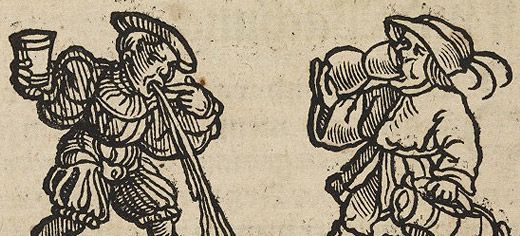
A new exhibition of University of Leeds research into the history of eating has opened at Pontefract Museum and will look at how ideas about nutritional health have changed over the years.
The free exhibition considers a host of nutritional diseases and illnesses. Rickets, scurvy, gout and famine seem to be problems of the past in this country, but what about alcoholism, type 2 diabetes and obesity? Visitors see how ideas about body image and health have changed over the centuries between the Middle Ages and today. There are displays of real human bones, many from Yorkshire archaeological sites. Interactive displays such as beer goggles and body morphing mirrors strike a balance between grim reality and historical entertainment. There are recipe cards for people to take away and try some balanced and delicious medieval dishes. There are also examples of historical diets that we would rather you didn't try at home!
The Dark Side of Eating runs until October at Pontefract Museum and is part of the You Are What You Ate project run by the University of Leeds, the University of Bradford and Wakefield Council and funded by the Wellcome Trust. Dr Vicky Shearman, Senior Cultural Officer of Wakefield Council explains that this is 'a wonderful opportunity for the museum to work with academics from Leeds and Bradford, bringing together diverse information and objects into an exhibition which will appeal to a wide audience'.
Dr Iona McCleery, project coordinator and historian at the University of Leeds, explains 'the exhibition complements our last exhibition Sugar and Spice and All Things Nice at Wakefield Museum. Then we focused on the fun side of food - now we are exploring its dark side. Too much medieval feasting could lead to the same health problems that we are familiar with today'.
'Getting enough to eat was the primary concern of pre-modern people', says Professor Gary Williamson of the School of Food Science and Nutrition at the University of Leeds. He adds 'once the threat of infectious diseases had passed, a healthy diet was the main route to a longer more active life. Dr Jo Buckberry, expert in the analysis of archaeological human remains at the University of Bradford adds 'seeing how these diseases can affect your body really makes you think about them more seriously - it brings an abstract concept to life'.
Professor Janet Cade of the School of Food Science and Nutrition at the University of Leeds points out 'it is not just a limited diet that causes poor health. We need to think about all the other related things that effect health: exercise, alcohol, smoking and other lifestyle choices also play their part'.
Dr McCleery added: 'None of these factors is new in northern England but there were differences: 600 years ago the rich could suffer from obesity but this was often viewed as a sign of wealth. The poor could be lean and fit - it depended on whether the harvest was good.'
You Are What You Ate: Food Lessons from the Past is a three year research project funded by a Society Award from the Wellcome Trust. It involves academics from the University of Leeds, the University of Bradford and Cultural Officers from Wakefield Council. Project members are working together to deliver a wide range of school activities, stalls, exhibitions and events. In conjunction with this new exhibition there will be a series of free public talks at Pontefract Library during March and April 2011 delivered by specialists on the history of food, drink and lifestyle.
The Dark Side of Eating exhibition opened at the beginning of March and runs at Pontefract Museum until 1 October.
Image credit: Wellcome Trust
For more information
Iona McCleery is available for interview. Contact: University of Leeds Communications & Press Office: Tel +44 (0)113 343 4031, email pressoffice@leeds.ac.uk
Notes to editors
- Full details of the You Are What You Ate project is available at www.leeds.ac.uk/youarewhatyouate
- For directions to the exhibition visit: http://www.wakefield.gov.uk/CultureAndLeisure/Castlesandmuseums/Museums/Pontefract/default.htm
- Iona McCleery has been lecturer in medieval history at the University of Leeds since 2007, prior to which she held a Wellcome Research Fellowship in the History of Medicine at the University of Durham.
- The Society Awards are part of the Wellcome Trust's Engaging Science grants programme which funds projects which engage the public with biomedical science and its social contexts. The Society Awards aim to support public engagement activities which have a significant impact at national or regional level and that address a key need.
- The exhibition is open Monday to Friday between 10.00am and 4.30pm and Saturday between 10.30am and 4.30 pm. Admission is free.